“People would say ‘You shouldn’t be sayin’ that. You should be talkin’ about country music.’ And I said, ‘Why not? It’s the truth! Why can’t I say I’m a Beatles fan?’ I used to get criticized for that.” Those words are from country music great Buck Owens, who would have turned 86 today. He was responding to the country purists who accused him of selling out by adding rock elements to his repertoire in the mid-’60s. Most rock fans know that The Beatles recorded a version of Buck’s 1964 hit “Act Naturally,” which featured cowboy-loving Ringo on vocals. But few realize that Buck was a fan of The Beatles even before they chose his song as the B side of “Yesterday.”
Buck Owens was a pioneer of the “Bakersfield sound,” an upbeat, stripped-down honky-tonk style of music that mixed old-time country swing with electric guitars and a rocking backbeat. Bakersfield music stood as a type of revolt against the Nashville sound, with its slick, sweet orchestrations and polished production values. Buck enjoyed a 50-year career as a singer, songwriter and musician. He and his band The Buckaroos placed 21 No. 1 hits on the Billboard country music charts. Yet, he never really followed a strict country formula for success.
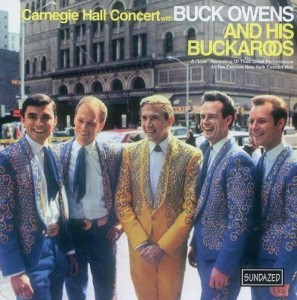 Soon after the British Rock Invasion of 1964, Buck started buying Beatles albums and performing “Twist and Shout” using the Beatles’ arrangement of the old Isley Brothers hit. He and his band members even donned Beatle wigs when they performed the song at Carnegie Music Hall for a live album recording in 1966! All the while, The Beatles were requesting four copies of all of Buck’s albums through their mutual record label, Capitol. The Beatles, like many British rockers of that era, loved country music. Their mid-’60s compositions – “I’ll Cry Instead,” “I’ve Just Seen a Face” and “What Goes On” – are among the earliest examples of country-inspired rock songs.
Soon after the British Rock Invasion of 1964, Buck started buying Beatles albums and performing “Twist and Shout” using the Beatles’ arrangement of the old Isley Brothers hit. He and his band members even donned Beatle wigs when they performed the song at Carnegie Music Hall for a live album recording in 1966! All the while, The Beatles were requesting four copies of all of Buck’s albums through their mutual record label, Capitol. The Beatles, like many British rockers of that era, loved country music. Their mid-’60s compositions – “I’ll Cry Instead,” “I’ve Just Seen a Face” and “What Goes On” – are among the earliest examples of country-inspired rock songs.
Eventually, Buck’s penchant for performing pop-rock songs began to elicit criticism from his hard-core country fans. He felt compelled to purchased a full-page ad in the March 1965 issue of the Nashville-based fan magazine Music City News to announce his “Pledge to Country Music:”
I shall sing no song that is not A country song. I shall make no record that is not a country record. I refuse to be known as anything but a country singer. I am proud to be associated with country music. Country music and country music fans made me what I am today. And I shall not forget it.
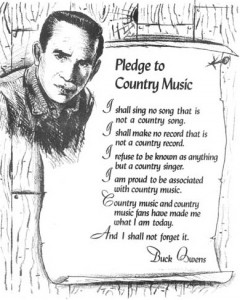 What’s up with that, Buck? Bowing to pressure from purists? When he included Chuck Berry’s “Memphis” on his 1965 LP “I’ve Got a Tiger by the Tail,” he was accused of reneging on his promise. His response: “I see ‘Memphis’ as bein’ rockabilly. I didn’t say I wasn’t gonna do rockabilly. I just said I ain’t gonna sing no song that ain’t a country song. I won’t be known as anything but a country singer. I meant that, I still mean that. Listen to the lyrics. If they’re not country lyrics…the melody…if that ain’t a country melody…The only thing was, a black man was singin’ it, a black man who I was a big fan of.”
What’s up with that, Buck? Bowing to pressure from purists? When he included Chuck Berry’s “Memphis” on his 1965 LP “I’ve Got a Tiger by the Tail,” he was accused of reneging on his promise. His response: “I see ‘Memphis’ as bein’ rockabilly. I didn’t say I wasn’t gonna do rockabilly. I just said I ain’t gonna sing no song that ain’t a country song. I won’t be known as anything but a country singer. I meant that, I still mean that. Listen to the lyrics. If they’re not country lyrics…the melody…if that ain’t a country melody…The only thing was, a black man was singin’ it, a black man who I was a big fan of.”
Well, I’ll overlook him. Those were different times. Besides, he remained a maverick in many respects as the decade advanced. In 1967, he and The Buckaroos suited up in sparkling outfits to play the Fillmore West, a San Francisco hippie venue known for hosting rock bands, not country acts. The band’s dueling Telecaster licks wowed the crowd. Performances like these were a huge influence on a young Gram Parsons, who helped to pioneer country rock during his short life.
That same year, Buck and the boys became one of the first country bands to tour Japan. The resulting album, “Buck Owens and His Buckaroos in Japan,” was perhaps the first country album recorded outside of the United Sates.
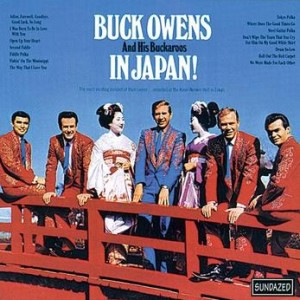
Buck went on to perform at venues not usually frequented by country performers: Madison Square Garden, the London Palladium and the Royal Albert Hall. Interestingly, he never played the Grand Ole Opry in his heyday (save for one brief appearance, when he played guitar for Tommy Collins in 1954). He was a Bakersfield boy, not a Nashville cat. I believe the Rolling Stones were paying homage to Buck in their honky 1978 song “Far Away Eyes,” when Mick sings, I was driving home early Sunday morning, through Bakersfield… The song’s title may even have sprung from these Buck Owens lyrics: I can see that far-away look in your eyes.
Thanks to that ol’ Wurlitzer in my grandparents’ tavern, I knew about Buck even before I heard The Beatles’ version of “Act Naturally.” His 1964 single “I’ve Got a Tiger by the Tail,” with its B side “Crying Time,” was popular among our bar’s coalminer clientele. Those songs were favorites of mine, as well, right alongside all The Beatles tunes. Buck’s records introduced me to country music. As a kid, I loved the western swing of “Tiger,” but it was “Crying Time” that’s long struck my melancholy chord. Mood-spinners like me always know when it’s crying time again.
Happy 86th birthday, Buck, and thanks for always acting naturally.
Here’s Buck and His Buckaroos performing “I’ve Got a Tiger by the Tail” in 1966. Oh, the gorgeous, glittering suits! I think it’s pretty durn cute the way Buck grins while he’s singing this song.
Oh, “Crying Time”! What fabulous lyrics. White man’s blues. Even though Buck wrote this song and recorded it in 1964, it was Ray Charles’ 1966 version that became the bigger hit.
© Dana Spiardi, August 12, 2015

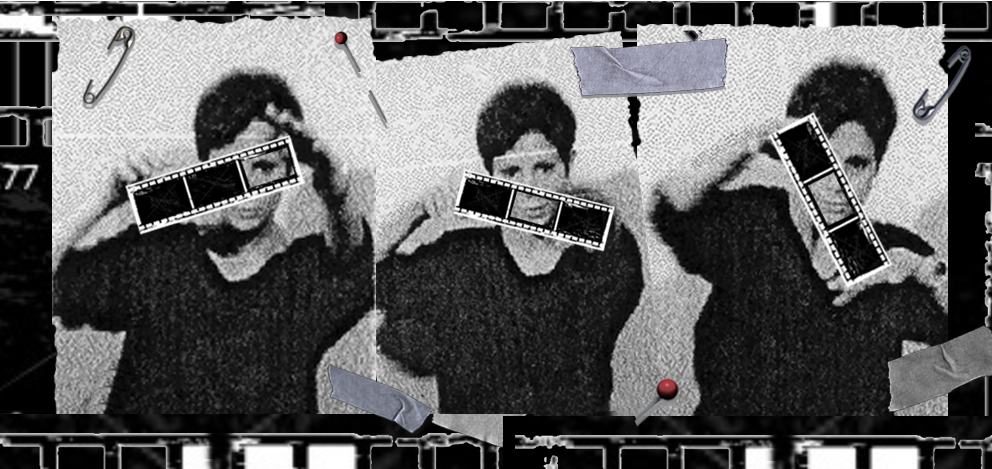
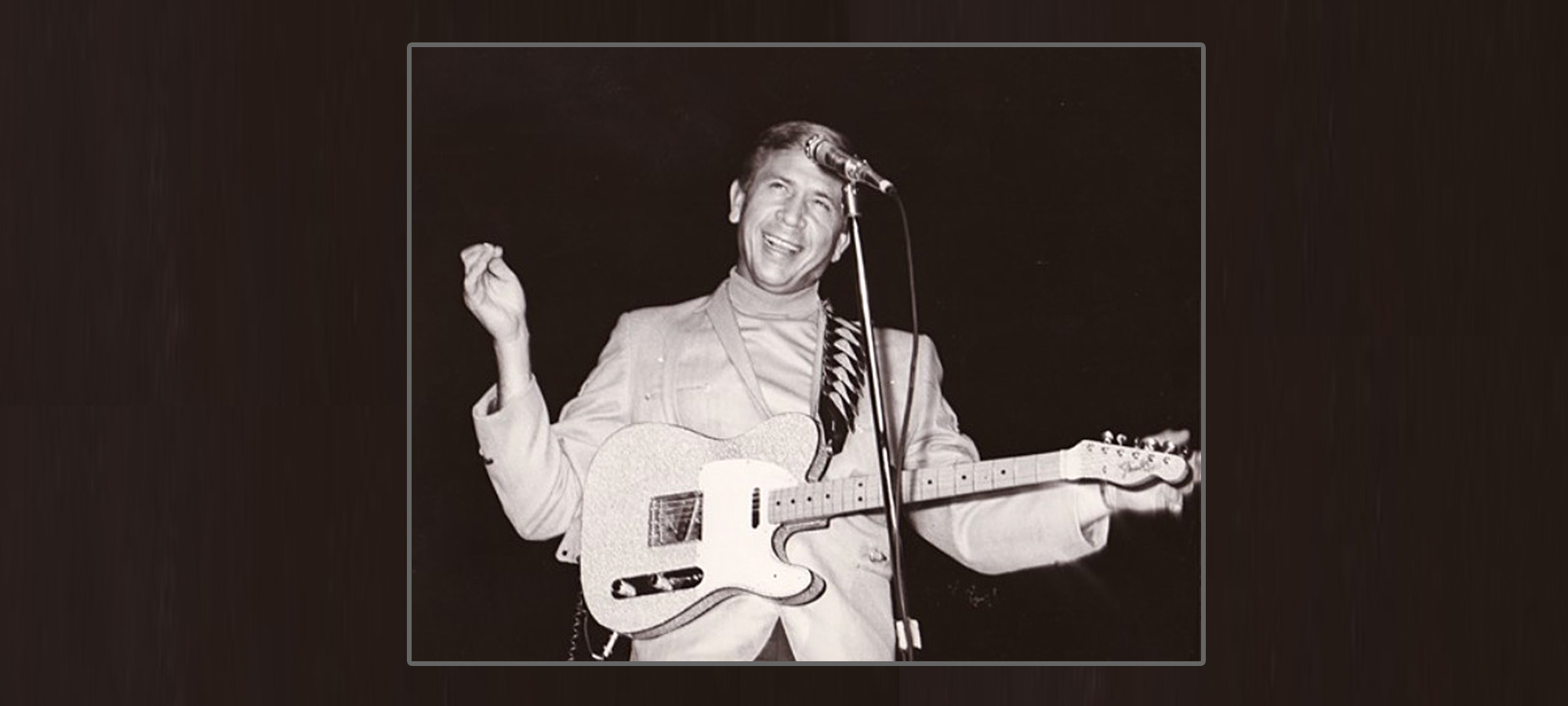
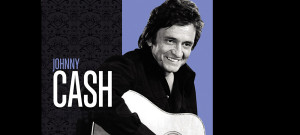
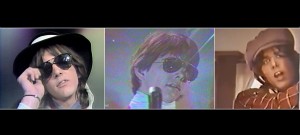
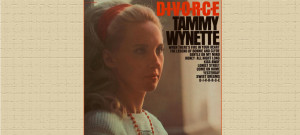
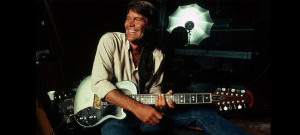
I watched HEE-HAW all the time with my parents. My father was the type that complained when someone like Buck showed or expressed affection for the rock movement of the times. That’s a shame about the “Pledge To Country Music”, It seems like he was manipulated into going against his heart, or did he sell out?
I’ve always been a secret country fan and I like Buck Owens. We shouldn’t try to pigeon-hole artists any more than people in general. So it goes without saying that I liked this post!